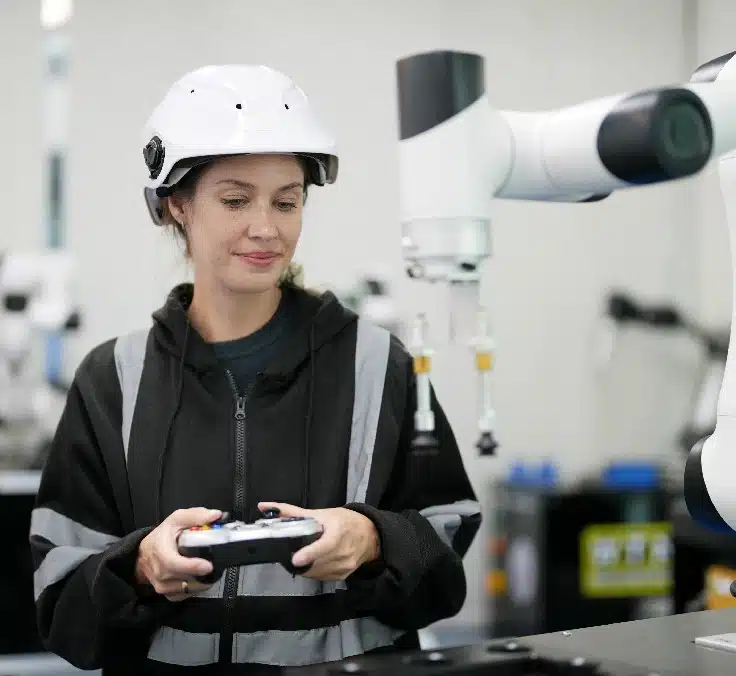INNOVATION| 29.05.2023
AI gains momentum in insurance to revolutionize the customer experience
Advances in the field of artificial intelligence (AI) are coming thick and fast, and they are already changing the reality of jobs and businesses, including in the insurance industry.
This technology and its different applications, such as voice, text, or image processing, are making the work of professionals more efficient but, above all, they are optimizing the way they relate to their customers.
“Artificial intelligence is now part of the everyday operations at MAPFRE. We have dozens of AI algorithms and use cases applied in two main strands: internal process efficiency and to improve the customer experience,” explained Miguel Ángel Rodríguez Cobos, Global Head of Innovation at MAPFRE. Process automation and decision-making support are the two functions that MAPFRE is finding most useful in this area.
Meanwhile, customer service is evolving in leaps and bounds with artificial intelligence as responses to users’ needs become faster and more accurate. It’s a revolution, and its effects are only just beginning to become apparent due to the very learning capacity on which AI is based.
The following are two of MAPFRE’s most noteworthy projects that show how the transformation of the sector is taking shape:
- Esencia Project: AI to streamline claims management
Insurance is an atypical industry in that, generally speaking, after paying for a policy, the customer does not get a tangible product or service, but a commitment that the company will respond when a problem arises. At such times, paperwork can become a nuisance for the customer, making simplicity and speed the key to a good solution. To this end, artificial intelligence, which has left its mark on this project, is the perfect ally.
When the customer files the claim, the AI is able to process all the information the user provides, including what they state in their own words and the images and documents they attach (e.g., a quote or invoice). This allows it to make automatic processing decisions.
There will be cases where AI will go as far as to immediately resolve the claim without requiring human intervention. The most common example is a claim where the customer submits an invoice, and the system checks that everything is correct before directly authorizing payment. In other cases, the AI gathers all the necessary information by requesting any missing information from the customer and performs a preliminary analysis before passing the case on to a professional who will now have everything they need to make a final decision. In either scenario, the customer will benefit from a much quicker resolution.
- Iris Project: automatic vehicle verification thanks to AI
The customer has just bought a used car and needs insurance to be able to start driving it. Not long ago, taking out an insurance policy required bringing the vehicle to an official center where it could be checked beforehand. More recently, users have had the option of submitting photographs to be examined by a reviewer. However, this process can take several days.
Now, the IRIS project makes it possible to do the same verification in a matter of seconds. The customer receives an SMS with a link to an online solution (there is no need to download an application) that instructs them to take several pictures of the car. The images are sent instantly, and the artificial intelligence tool analyzes them in real time to identify any damage to the car body and, thus, automates the policy purchasing process.
In order for this mechanism to reliably discern, for example, a scratch from a stain, a deep learning algorithm has been applied which trains the AI by providing it with a large number of real cases. After analyzing thousands of photographs and the correct answer for each one, the system is able to solve new cases with over 95% accuracy.
“These projects offer both personalized service and greater efficiency in terms of response time and resolution time, which is in the interest of the customer, the main beneficiary,” said Miguel Ángel Rodríguez Cobos. “The customer perceives a big change because, when they need us, we can solve their case without a lot of the red tape that used to get in the way,” he added.
The future of AI in the industry
Industry experts firmly believe that artificial intelligence will continue to make progress in the insurance industry, where advanced analytics and machine learning and deep learning algorithms show the greatest potential to transform internal processes and contact with customers. Generative AI, which is currently trending in the news and public debate, is also an area that many companies are exploring. Nevertheless, companies must always assess in which cases it provides value for the user.
A key consideration will also be how the use of AI adapts to emerging regulations, such as the one already announced by the European Union for 2024. The boom in this technology has been accompanied by an increase in the number of laws passed by countries and international organizations to regulate it. AI is an area yet to be explored, and these legal frameworks can provide clarity on the direction it should go in and the limits that are beginning to take shape, both for companies and for other public and private actors.
Moreover, it is not only a legal issue: ethical issues are an important part of the debate. It is here that the role of the human worker becomes more important, as humans will always be needed to oversee this technology and ensure that best practices are applied and that its use remains for the benefit, first and foremost, of people.
RELATED ARTICLES:




